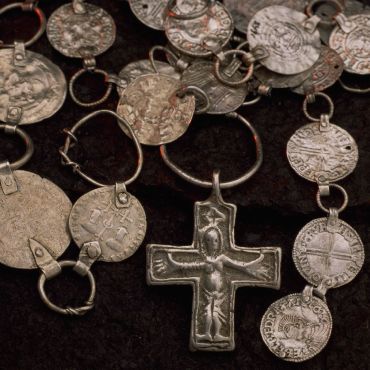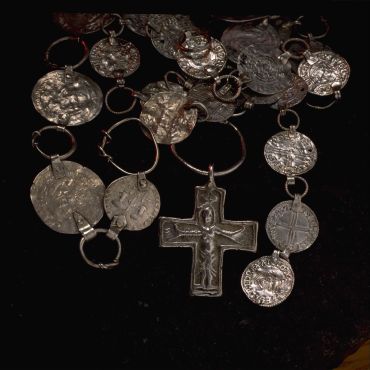The Heritage of Money and Coinage: objects and practices in transformation
Explore money and coinage from a heritage, diachronic and cross-cultural perspective!
← Back to courses- CIVIS focus area
- Society, culture, heritage
- Open to
-
- Bachelor's
- Master's
- Phd
- PhD candidates/students
- Field of studies
-
- Art, Design and Media
- Business and Management
- Computer Science and IT
- Engineering & Technology
- Environment & Agriculture
- Natural Sciences and Mathematics
- Social Science and humanities
- Environmental sciences, Urbanism, Geography
- Type
-
- Blended Intensive Programmes (BIP)
- Course dates
- 29 April 2025 - 24 June 2025
The study of money and coinage is a scholarly topic of highest relevance for society and perfectly suited to be treated interdisciplinary, applying diachronic and cross-cultural perspectives. The heritage and impact of pre-modern and early modern monies is vast and it is culturally deeply embedded in today’s global societies: in economy, social life, the arts, cultural heritage, industrial heritage, societal organisation, and more. Today, society is undergoing great changes when it comes to the use of physical and digital monies. This creates practical challenges and possibilities, but also raises issues regarding citizen rights, social-economic participation, social resilience and personal integrity. To revisit the historical use of economic means in different cultural and temporal settings will provide important perspectives on environment, politics and practices. This involves e.g. the exploitation of natural resources involved in production (physical and digital), and the cognitive, conceptual and intellectual processes involved in ancient monetisation and monetary practices.
The course aims to offer students insights and knowledge about the money and coinage from a heritage, diachronic and cross-cultural perspective: their strong and culturally embedded legacies, and their roles in transformative practices in the past and present.
Main topics addressed
The program provides to the students knowledge related to the following fields:
- Use, production and types of money
- Money roles in society and heritage over time
- Pre-modern and global concepts of coins and money
- Theory and method of money studies
- Hands-on management, communication and outreach
Learning outcomes
After completing the course, the students will acquire knowledge in:
- Acquaintance with pre-modern and global concepts of coins, money and related materials, including theories and methods
- Relevant processes of production and use (basic knowledge)
- Basic experience of heritage management of monies as well as of outreach and public discourse in the field
- Understanding and analysing the development, practices and legacies of money within social, economic, and cultural spheres in a global perspective
| Dates: 29 April 2025 - 24 June 2025 | Total workload:160 hours |
| Format: Blended | ECTS: 6* |
| Location: Stockholm and environs, Sweden | Language: English (Β2) |
| Contact: Nanouschka.burstrom@ark.su.se |
*Recognition of ECTS depends on your home university.
Physical mobility
The physical mobility part will be running from 9 to 13 June 2025 and will be held in Stockholm and environs, Sweden.
Schedule of the physical part
- Sun 8.6.2025 Afternoon arrival and check-in. City tour and Welcome Session (optional)
- Mon 9.6.2025 to Wed 11.6.2025 Half-day student conferences, half-day additional teaching, lectures, study visits and exercises in Stockholm
- Thurs 12.6.2025 to Fri 13.6.2025 Excursion by bus to the historical mining and minting district and other heritage sites north of Stockholm, Farewell dinner
- Saturday 14.6.2025 Departure
Virtual part
The virtual part will be running from 29 April 2025 to 24 June 2025.
Schedule of the virtual part
- 29.4.2025 Opening Session: Introductions, practicalities and introductory lecture
- 6.5.2025 Money, Materials and Methods – the Classical period
- 13.5.2025 Global and ethnographical monies
- 20.5.2025 From the Mine to the Mint
- 27.5.2025 Monies in transformation – the past, heritage and future Stockholm Summer School (c. 9.6.-13.6., detailed schedule tba)
- 17.6.2025 Follow-up online session: follow-up exercises, discussion, questions
- 24.6.2025 Assignment submission (via Moodle)
Requirements
This course is open to Bachelor's, Master's and PhD students at CIVIS member universities with a background and/or interest in Archaeology, Art History, Asian Studies, Classical Studies, Cultural Heritage, Economic History, Economy, Environmental studies, Human Geography, Industrial Design, Medieval Studies, Metallurgy, Social Anthropology.
The course is interdisciplinary and works for all cycles. Humanities and Social Sciences is the core, but also technological and natural-scientific angles are discussed and can be applied for the course work.
Critical thinking, previous experience in data analysis, experience in the field of digital humanities, oral presentation skills and scientific writing are considered as desirable skills for the students in order to follow the course.
NB: Visiting Students - Erasmus Funding Eligibility
To be eligible for your selected CIVIS programme, you must be a fully enrolled student at your CIVIS home university at the time you will be undertaking the programme. Click here to learn more about the eligibility criteria.
Students from CIVIS’ strategic partner universities in Africa cannot apply for participation in this course.
Application process
Send your application by filling in the online application form by 31 October 2024, including:
- CV
- Motivation letter
-
Level of english (According to CEFR)
Students' applications will be evaluated based on the following criteria:
- Relevance for the course theme
- Quality of motivation letter
- Track record (CV)
- Relevance for ongoing studies at home university
Assessment
The assessment will be based on the following criteria:
- Completion of all parts of the program – online and physical
- A short oral presentation on a topic of your choice as part of the “Student conference”
- A short, written paper on this topic to be handed in at the end of the course
Blended Intensive Programme
This CIVIS course is a Blended Intensive Programme (BIP): a new format of Erasmus+ mobility which combines online teaching with a short trip to another campus to learn alongside students and professors across Europe. Click here to learn more about CIVIS BIPs.
GDPR Consent
The CIVIS alliance and its member universities will treat the information you provide with respect. Please refer to our privacy policy for more information on our privacy practices. By applying to this course you agree that we may process your information in accordance with these terms.
Dr. Nanouschka Myrberg Burström, Associate Professor and Senior Lecturer, Department of Archaeology and Classical Studies, Stockholm University: Archeology and cultural heritage of Northern Europe, Iron Age and Middle Ages, Numismatics, theory and method
Dr. Alexander Jost, Senior Scientist, Global History and Sinology, Paris Lodron University of Salzburg: Asian Studies, Sinology, Metallurgy
Dr. Stefan Krmnicek, Privatdozent, Institute of Classical Archaeology, University of Tübingen: Classical Studies, Roman coinage and museum curation, Theory and method
Dr. Annalisa Polosa, Associate Professor, Ancient Numismatics, Sapienza Università di Roma: Classical coinage, the Mediterranean World
Documents
-
74 Ko heritage-of-money-motivation-letter-2024.pdf
-
13 Ko heritage-of-money-motivation-letter-2024.docx
-
821 Ko civis-stockholm-2025-flyer-2.pdf


